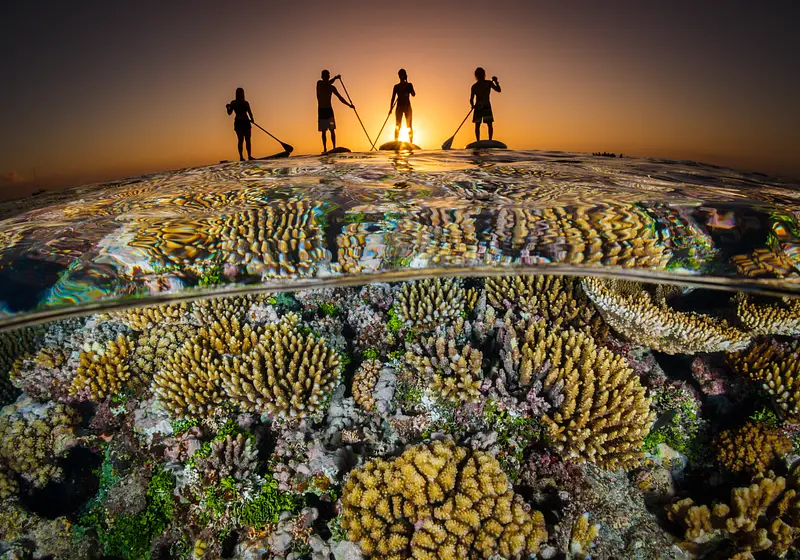In 2017, the documentary "Chasing Coral" was released on Netflix, to much critical acclaim. Documenting the extensive coral bleaching between 2014 and 2017, the film explores what's happening to the world's corals, and what can be done to save them. Vevers, the founder of The Ocean Agency, takes the viewers on a first-hand journey to coral ecosystems on the brink of collapse.
Thankfully, Netflix has uploaded the full feature film to Youtube. It's completely free to watch, regardless of whether you have a Netflix account or not.
The Ocean Agency's latest campaign has been the 50 Reefs Initiative: a mission by the creators of Chasing Coral to survey and record the 50 coral reef ecosystems that display the best chances of surviving global climate change.
"The initiative had the ambitious goal of identifying a global portfolio of coral reefs with a good chance of both surviving the impacts of climate change and being able to help repopulate neighboring reefs."
- The Ocean Agency
I interviewed Vevers to give us insight into the future of our coral reefs, 5 years on from Chasing Coral, and found out what we can all do to help save our coral reefs.
Chasing Coral was a huge success, and you've said that the 50 Reefs Initiative stemmed from your work on the film. What action have you seen taken as a result of the 50 Reefs Initiative? What action would you like to see?
"We've seen growing funding in coral reef protection and restoration as a result of the 50 Reefs study - targeting action where it is likely to make the most impact made sense to donors and it has led to over $93m in funding for the 50 locations identified."
Throughout the world, climate change has caused severe coral bleaching, over 50% of our coral reefs have already died. Scientists have warned that the effects of climate change are only just beginning to be felt, casting a grim forecast for the world's coral reefs. This is what makes Vever's work so important.
"However, the ecosystem is worth $2.7 Trillion to the global economy each year," he continues, "so really we need to be spending billions not millions to save it."
Here he's referencing the human impacts of coral reef degradation: billions of people around the world rely on fish to sustain their diets and livelihoods, and when these corals die, it causes a food security crisis for us all.
While it seems action is being taken, it doesn't seem to be happening fast enough. Do you feel hopeful about the future of coral reefs?
There's no denying it will be tough to save coral reefs. It will come down to the wire. However, I am still optimistic.
- Richard Vevers
"We hunted humpback whales until there were only 4% left, and now their numbers have bounced back to about 65% of their original numbers. Nature is remarkable at recovery when it is given a chance."
"Often, unexpected events happen that help and can't be predicted, so it is important to do whatever we can and do it now."
"Coral reefs have been around for half a billion years and they've survived multiple extinction events. Ultimately, they are likely to survive. However, there's an awful lot we can do to help ensure this and allow them to bounce back quickly."
Within the next century, the world is expected to reach around 2.4C if all commitments are kept - have your team found any coral ecosystems that could survive that level of warming?
"The scientific community (IPCC) predicts that 99% of the remaining reefs will be lost if temperatures exceed 2 degrees C," he begins. "Which is why it is so critical we limit global warming to below 2 degrees C."
The best available science suggests that corals cannot survive in a world that has warmed 2C, and so every action to stop climate change is an action to reduce the damage done to coral reefs.
What actions can our readers take to help protect coral reefs - especially those of us that don't live by the beach?
"The single biggest threat to coral reefs by far is climate change."
Any action to prevent global warming helps coral reefs and this can be done wherever you are in the world.
"I'd say the two best ways to do this are 1) show your support for climate action but do it in a positive way (your support may lead to many others supporting action and influencing businesses and governments), 2) commit to wasting less, such as food, water and stuff you don't really need or particularly want. You'll end up saving money whilst helping save coral reefs... it's a win-win."
Political leadership is the fastest way to solve this problem, so show your support for climate action. Email your local representative and ask them to support climate legislation, and ask them what they intend to do to protect nature within their constituency.
The Imperial College of London suggests eating less meat and dairy, contacting your local representatives and avoiding flying, are the best ways to reduce your carbon footprint.
Do you have any more plans for making a new documentary?
"Documentaries are incredibly powerful and have the potential to inspire action if you have a great director. We don't have any plans to do another documentary at the moment but we are always open to the idea."
"I think the story of 50 Reefs would make a great documentary," said Vevers.
Hey, if you know any Hollywood Executives, why not send them this article?
credit: The Ocean Agency/Jeff Hester
What can policymakers do to protect the world's coral reefs?
"We really just need two actions from policymakers to save coral reefs."
We need to stick to the international agreement to limit global warming to well under 2 degrees C. Secondly, agree to protect 30% of the ocean from fishing, especially important coral reefs that are less vulnerable to climate change. These reefs can help the ecosystem recover over time."
The UK's prime minister recently launched the "Global Ocean Alliance: 30 by 30 initiative", which aims to protect 30% of the world's oceans by 2030. Notable countries, including Australia, Barbados, Canada, Fiji, Costa Rica, Germany, Italy and the UAE have all signed onto this initiative. Neither the United States, Russia nor China have agreed to this deal yet.




